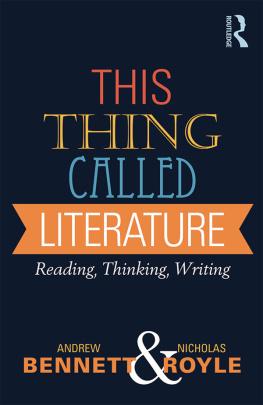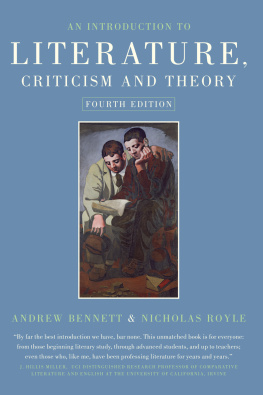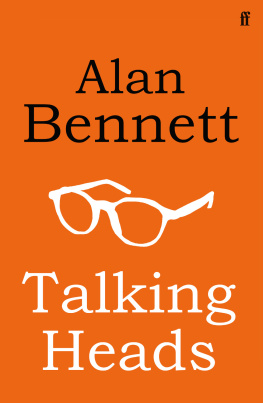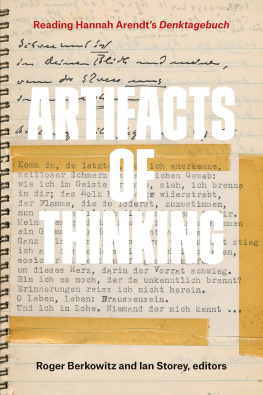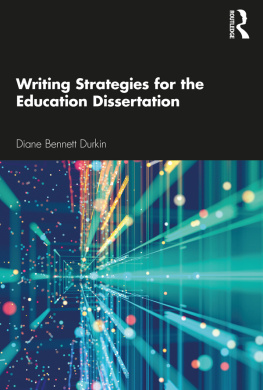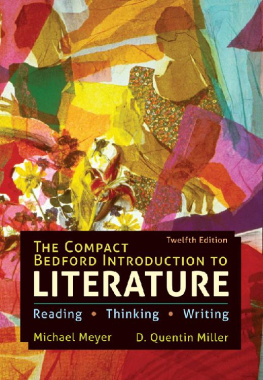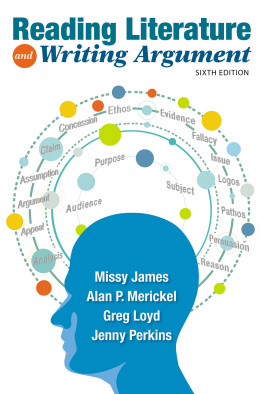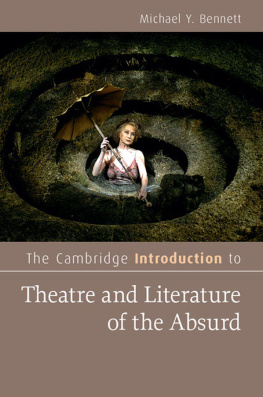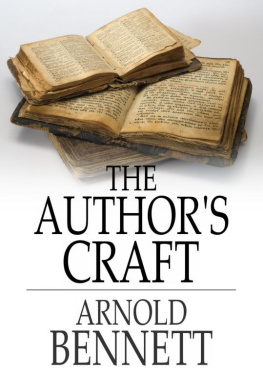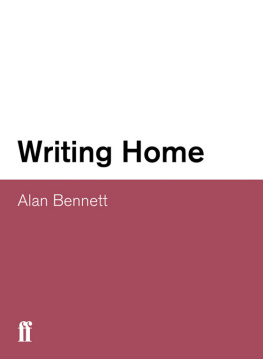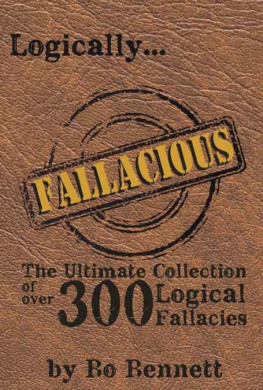Bennett Andrew - This thing called literature : reading, thinking, writing
Here you can read online Bennett Andrew - This thing called literature : reading, thinking, writing full text of the book (entire story) in english for free. Download pdf and epub, get meaning, cover and reviews about this ebook. City: New York et al., year: 2015, publisher: Routledge, genre: Children. Description of the work, (preface) as well as reviews are available. Best literature library LitArk.com created for fans of good reading and offers a wide selection of genres:
Romance novel
Science fiction
Adventure
Detective
Science
History
Home and family
Prose
Art
Politics
Computer
Non-fiction
Religion
Business
Children
Humor
Choose a favorite category and find really read worthwhile books. Enjoy immersion in the world of imagination, feel the emotions of the characters or learn something new for yourself, make an fascinating discovery.
- Book:This thing called literature : reading, thinking, writing
- Author:
- Publisher:Routledge
- Genre:
- Year:2015
- City:New York et al.
- Rating:3 / 5
- Favourites:Add to favourites
- Your mark:
- 60
- 1
- 2
- 3
- 4
- 5
This thing called literature : reading, thinking, writing: summary, description and annotation
We offer to read an annotation, description, summary or preface (depends on what the author of the book "This thing called literature : reading, thinking, writing" wrote himself). If you haven't found the necessary information about the book — write in the comments, we will try to find it.
This thing called literature : reading, thinking, writing — read online for free the complete book (whole text) full work
Below is the text of the book, divided by pages. System saving the place of the last page read, allows you to conveniently read the book "This thing called literature : reading, thinking, writing" online for free, without having to search again every time where you left off. Put a bookmark, and you can go to the page where you finished reading at any time.
Font size:
Interval:
Bookmark:
A very shrewd, lively, and at times irreverent introduction to literary study, which explains that thinking about literature is thinking about everything else, including thinking.
Jonathan Culler, Class of 1916 Professor of English and Comparative Literature, Cornell University, USA
Clear, fair-minded, and patiently elaborating, this is an invaluable field guide for seasoned teachers and scholars as well as beginning students.
Wai Chee Dimock, William Lampson Professor of English & American Studies, Yale University, USA
The seasoned authorial duo of Bennett and Royle has pulled it off again. Avoiding both simplification on one side, and over-abstraction on the other, this new book will engage and appeal to all readers with doubts or hopes about studying literature seriously.
Rachel Bowlby, Professor of Comparative Literature, Princeton University, USA
Reports on the so-called death of literature its increasing irrelevance in an age of digital reason are, we have long suspected, greatly exaggerated. Andrew Bennett and Nicholas Royle confirm this with a timely and robust case for the defence, repositioning literary studies at the centre of the humanities. With their eloquent readings, witty aperus and compendious range of reference, the authors provide the kinds of insightful pleasures that, they argue, are central to the literary arts themselves. The books brevity is no indication of its ambition: if This Thing Called Literature does not make you a better reader, writer, critic and thinker, you havent been reading it closely enough.
Paul Sheehan, Macquarie University, Sydney, Australia
Literature, it turns out in Bennett and Royles invigorating introduction to the topic, is anything but a thing: it is an activity, a provocation, an experience, a conundrum. This highly readable book is an important contribution to debates about why literature matters at the same time as offering a practical guide to the understanding and enjoyment of literary works, the task of writing about them, and the challenge of creating them.
Derek Attridge, Professor of English, University of York, UK
What the duo of Strunk and White is to writing well the duo of Bennett and Royle is to reading carefully and, especially, to thinking deeply about literature. This Thing Called Literature is a fun, fresh take on why we study literature and how to do it and is a useful and accessible read for students just beginning their study; it is also a rewarding, heartening read for those of us who got into the business of literary study for the love of reading, thinking, and writing.
Daniel Robinson, Homer C. Nearing Jr. Distinguished Professor of English, Widener University, USA
This Thing Called Literature is another triumph by Andrew Bennett and Nicholas Royle. They are our most trusted guides to literary study writing today. Their exemplary pedagogy opens up the wonders and complexity of both literature and study itself. The future of reading has been given a fighting chance by this wonderful book, which will benefit everyone who reads it from the A Level student to the Emeritus Professor.
Martin McQuillan, Kingston University, UK
This Thing Called Literature
What is this thing called literature? Why should we study it? And how?
Relating literature to topics such as dreams, politics, life, death, the ordinary and the uncanny, this beautifully written book establishes a sense of why and how literature is an exciting and rewarding subject to study. Bennett and Royle delicately weave an essential love of literature into an account of what literary texts do, how they work and what sort of questions and ideas they provoke.
The books three parts reflect the fundamental components of studying literature: reading, thinking and writing. The authors use helpful, familiar examples throughout, offering rich reflections on the question What is literature? and on what they term creative reading.
Bennett and Royles lucid and friendly style encourages a deep engagement with literary texts. This book is not only an essential guide to the study of literature, but an eloquent defence of the discipline.
Andrew Bennett is Professor of English at the University of Bristol, UK.
Nicholas Royle is Professor of English at the University of Sussex, UK.
This Thing Called Literature
Reading, thinking, writing
Andrew Bennett and Nicholas Royle

First published 2015
by Routledge
2 Park Square, Milton Park, Abingdon, Oxon OX14 4RN
and by Routledge
711 Third Avenue, New York, NY 10017
Routledge is an imprint of the Taylor & Francis Group, an informa business
2015 Andrew Bennett and Nicholas Royle
The right of Andrew Bennett and Nicholas Royle to be identified as authors of this work has been asserted by them in accordance with sections 77 and 78 of the Copyright, Designs and Patents Act 1988.
All rights reserved. No part of this book may be reprinted or reproduced or utilised in any form or by any electronic, mechanical, or other means, now known or hereafter invented, including photocopying and recording, or in any information storage or retrieval system, without permission in writing from the publishers.
Trademark notice: Product or corporate names may be trademarks or registered trademarks, and are used only for identification and explanation without intent to infringe.
British Library Cataloguing in Publication Data
A catalogue record for this book is available from the British Library
Library of Congress Cataloging in Publication Data
Bennett, Andrew, 1960
This thing called literature: reading, thinking, writing / Andrew Bennett, Nicholas Royle.
pages cm
Includes bibliographical references and index.
1. Literature Appreciation. 2. Literature Philosophy. 3. Reading. 4. Authorship. I. Royle, Nicholas, 1957-II. Title.
PN45.B395 2015
801.3 dc23
2014007931
ISBN: 978-1-138-01925-6 (hbk)
ISBN: 978-1-408-25401-1 (pbk)
ISBN: 978-1-315-77904-1 (ebk)
In this book we hope to give a sense of why and how literature might be an exciting and rewarding subject to study. Our primary concern is with a love of literature, with what literary texts do, with how they work and what sorts of questions and ideas they provoke. Our aim is to be concise, to give pleasure, and to provide a clear and stimulating account of studying literature.
This book is primarily written for people who are starting, or who are thinking about starting, literary studies at college or university. We begin at the beginning, with the questions: What is literature? and Why study it? We then have a series of chapters on the three basic activities involved in studying literature: reading, thinking and writing. Part One comprises short chapters on reading a poem, reading a novel, reading a story, and reading a play. Part Two considers the question What is thinking? especially as regards thinking in and about literature, and thinking critically. Part Three turns to questions of writing. There are chapters on how to write an essay, on creative writing, and on writing fiction.
What is this thing called literature?
This is a question to which no one has yet provided an entirely satisfactory or convincing answer. As the critic Raymond Williams observes, in a discussion of this question in his book Keywords: Literature is a difficult word, in part because its conventional contemporary meaning appears, at first sight, so simple (Williams 1983, 183). The hedging precision of Williamss phrasing (in part, appears, at first sight) points towards the complexity of the question. It is possible to provide numerous cogent but ultimately unsatisfactory answers to the question What is literature?. We might start with a couple of dictionary definitions, along with an observation about the recent historical and institutional significance of the term literature.
Next pageFont size:
Interval:
Bookmark:
Similar books «This thing called literature : reading, thinking, writing»
Look at similar books to This thing called literature : reading, thinking, writing. We have selected literature similar in name and meaning in the hope of providing readers with more options to find new, interesting, not yet read works.
Discussion, reviews of the book This thing called literature : reading, thinking, writing and just readers' own opinions. Leave your comments, write what you think about the work, its meaning or the main characters. Specify what exactly you liked and what you didn't like, and why you think so.

